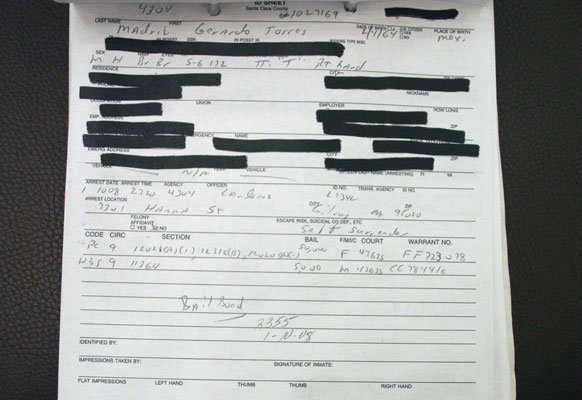Sign the on the line if you want the address.
This is the Gilroy Police Department’s new policy when it comes
to making public the residential address of people who are
arrested. But not everyone can sign on the line.
Sign the on the line if you want the address.
This is the Gilroy Police Department’s new policy when it comes to making public the residential address of people who are arrested. But not everyone can sign on the line.
Last week GPD stopped releasing the addresses of arrestees to the public, pointing to a part of the California Public Records Act that was amended in 1996 by the state legislature to make it so public agencies do not have to. Another part of the CPRA, though, states that public agencies must release the address to “an individual who is willing to declare under penalty of perjury and file a waiver that the (address) obtained is being used for scholarly, journalistic, political or governmental purposes,” according to a letter written by GPD Records Supervisor David Boles.
This means The Dispatch must sign a waiver every morning to get the address of an arrestee along with that person’s name, date of birth, the charge against the arrestee and where and when the alleged crime took place. If an eligible party refuses to sign the waiver, then it will not receive the arrestee’s address.
In the past, the arrest log at the police department contained all this information plus a brief description of the arrestee’s belongings at the time of arrest. Last week, however, GPD records employees were instructed to take a black permanent marker to all information about arrestees except their names, birthdays, the charges against them and the location and time of the alleged crime.
In particular, police blacked out the arrestees’ address, city of residence, phone number, employer, emergency contact and identifying marks – such as scars and tattoos. This caused more work for GPD employees, Boles said, so now records personnel will take the raw arrest log that they use to black out and instead type up a portion of the public information – which they already do for their own records – for the newspaper and other public parties.
The latest move is a nod to complaints by residents that they have a right to know if criminals are living in their neighborhood. It also parallels similar moves by other public agencies throughout Santa Clara County and others nearby. The SCC Sheriff’s Department the police departments of San Jose, Sunnyvale, Hollister and Santa Cruz, for example, all provide the same redacted information to the public, but only some agencies require the waiver, according to Boles.
The new change means residents will still be able to find out whether they live near an arrested party as long as the newspaper remembers to sign the waiver every morning. If the red tape falters, though, residents will only be able to find out whether they live near an arrested party if that person is a registered drug or sex offender.
Nearby law enforcement agencies do not require signatures, but differ in their policies. The South County office of the Santa Clara County Office of the Sheriff provides the block of the arrestee’s address, as well as the other required information about the arrest and a short summary of the incident. Farther south, the San Benito County Sheriff’s offers viewers a date, time, location, case number and description of an alleged crime, but it does not provide the arrestee’s name or any further information.
Boles indicated that Gilroy was simply finding its niche because every agency’s leader makes its own decision. Police Chief Gregg Giusiana signed off on GPD’s current policy, Boles said.*














